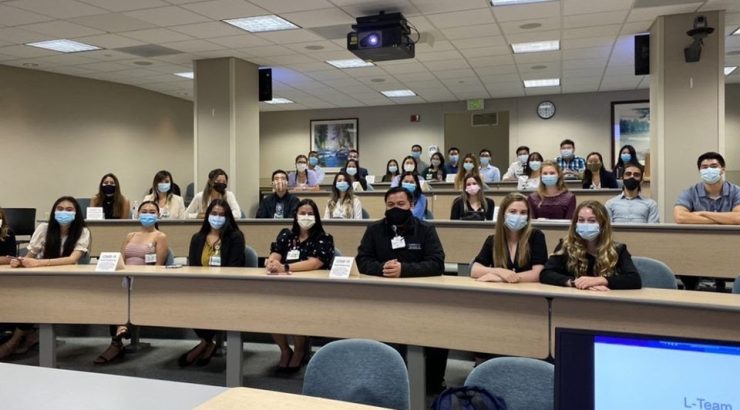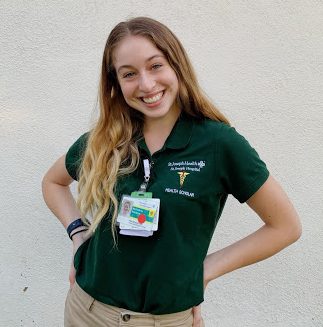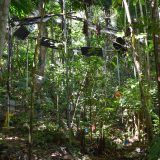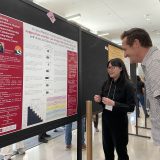
Hands-On Experience at St. Joseph’s Hospital During Pandemic Student Spotlight: COPE Health Scholar Michelina Nardone '21
September 24, 2020
 We are continuing our student spotlight series this week with Michelina Nardone! Michelina is a senior biological sciences major with a minor in Nutrition. She is originally from Seattle, Washington. This past summer, Michelina was a COPE Health Scholar at St. Joseph’s hospital.
We are continuing our student spotlight series this week with Michelina Nardone! Michelina is a senior biological sciences major with a minor in Nutrition. She is originally from Seattle, Washington. This past summer, Michelina was a COPE Health Scholar at St. Joseph’s hospital.
Q&A with Michelina:
Schmid College: Tell us about your experience as a COPE Health Scholar at St. Joseph’s!
Michelina Nardone: As a Cope Health Scholar, I had the opportunity to experience a variety of departments within a hospital setting. I first worked on the pulmonary renal floor, then the mother-baby unit, and now the emergency department! Each floor has a different day-to-day schedule. For example, pulmonary renal would mainly consist of feeding patients, taking labs down to the laboratory, and observing. The most interesting thing that I had the opportunity to observe was dressing massive wounds on both legs of the patient. The nurse explained each part of what she was doing and why, which helped keep me engaged in the process. As for the mother-baby, I was able to observe a circumcision and expand my knowledge on the health of the baby and mother postpartum. This is information that I will be able to apply to my own life in the future. Currently, I am shifting to the emergency department, which has been my favorite so far! What I find fascinating about the emergency department is that it encompasses all parts of the body. The emergency room is broken into sections, including wound care, x-ray, mental health, and much more. The beauty of shifting in this department is that I am able to observe a multitude of procedures, from suturing a deep wound to reading EKGs.
Another thing I would like to add is that I am a part of the leadership team for the St. Joseph Site in Orange! My specific role is the recruitment coordinator, and I love it. This position helps me gain and improve many professional skills that I will need for the near future. For example, I present to a wide range of college campuses about our program, which helps me improve my public speaking skills. This program is amazing because not only is the highlight getting hands-on clinical experience, but it allows scholars the opportunity to grow their professionalism.
SC: Why did you apply for this program?
MN: I applied to this program because one of my good friends at Chapman recommended it to me! She was boasting about how exciting each one of her hospital shifts was, and I was very intrigued. At the time, I was actively looking for shadowing opportunities in the Orange area. When she explained that this program was more than just observing, it was taking vitals, connecting with patients, and working alongside other healthcare workers. I was instantly fascinated and decided to apply.
SC: Did the COVID-19 pandemic impact or change this experience in any way?
MN: I joined the program right as the pandemic hit. The program gave the option for health scholars to take a leave of absence if they did not feel comfortable being in the hospital, but I decided that this is when the hospital needs our help the most, so I kept shifting. In the beginning, the hospital was extremely slow because everyone wanted to stay away. Therefore, my job at the time was also fairly slow. After about 2 weeks post-COVID, there was an influx of patients at the hospital, and my job became very busy. I am not allowed to work directly with COVID patients. Still, by helping the nurses, CNAs, and doctors with simple tasks, I helped them focus on the treatments and more time-sensitive jobs.
SC: How did Schmid and your academic program prepare you for the COPE Health Scholar Program?
MN: Because I am an anatomy and physiology emphasis, I was able to take Physiology B during the spring of my junior year. In the lab, we learned where to place the EKG leads on a person’s chest and how to read and interpret the test results. Being in the emergency department, I have been able to witness lots of different procedures, and analyzing an ECG was one of them. I was able to read the results and place leads on the patient without the help from a nurse (the nurse was observing to make sure I was doing it correctly), an experience that my previous internships did not allow me to do.
SC: How did this experience support your career goals?
MN: In the future, I want to attend medical school and become an emergency room physician (subject to change). This experience has connected me with many health care professionals and has helped solidify my career path. I cannot imagine myself doing any other career.
SC: What was the most important thing you learned this summer?
MN: Patience and compassion are key when working with patients. I have been able to observe a variety of healthcare professionals, all having different styles of delivering health care. Patients boast about their doctors when they can connect with them on a personal level, which is the type of doctor I dream of becoming in the future.
SC: What advice would you give to other students interested in programs like this one?
MN: Apply even if you are hesitant! I would recommend this program to anyone thinking about being a future health care professional, whether it be physician, PA, or nurse. The program gives you exposure to working with different types of healthcare workers, including the administrative side of healthcare. If you have questions about the program or want to know more about my personal experience, feel free to email me at sjorc4@copehealthscholars.org.
The Cope Health Scholars program is an amazing way for students to learn about the medical field! The deadline for the winter session is September 30. If you are interested in learning more, reach out to Michelina at the email provided above or contact the Center for Undergraduate Excellence.

